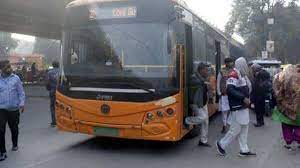50 Electric Buses launched in Delhi under FAME India Phase II scheme

FAME India Phase II scheme: With assistance from the Ministry of Heavy Industries’ FAME India Phase II programme, 50 electric buses were introduced in Delhi. In 2019, the government approved Rs 10,000 crore for a period of three years. Out of total budgetary support, about 86 percent of the fund has been allocated for incentives so as to create demand for electric vehicles. Electric Vehicles are vehicles that are partially or fully powered on electric power. They have low running costs and are also very environmentally friendly as they use little or no fossil fuels (petrol or diesel). These vehicles can solve the problems of increasing pollution, global warming, depleting natural resources etc.
January 2023 Current Affairs Quiz
Important facts:
- According to Mahendra Nath Pandey, the Union Heavy Industries Minister, the government has ordered 3,538 electric buses. Of these, a total of 1,716 buses have been deployed so far.
- The Union Territory of Delhi had sanctioned 400 electric buses – 300 to the Delhi Transport Corporation (DTC) for intra-city operations and 100 to the Delhi Metro Rail Corporation (DMRC) for last-mile connectivity – in August 2019.
- A total of 250 buses have already been deployed by DTC and now the remaining 50 buses have been launched fulfilling MHI’s commitment of providing 300 electric buses to DTC.
FAME India Scheme:
- The Government formulated a Scheme namely FAME India (Faster Adoption and Manufacturing of Hybrid and Electric Vehicles) in 2015, to improve the infrastructure required for the large-scale use of electric vehicles.
- This programme aims to have 60-70 lakh hybrid and electric cars and trucks on the nation’s roads by the year 2022. This will reduce the consumption of about 950 crore litres of petrol and diesel, which will also save Rs 62 thousand crores spent on this.
- Reducing pollutants and greenhouse gas emissions is the main goal of this plan. From April 1, 2019, Phase-II of the FAME India Scheme will be in effect for 3 years.
- The Phase-I of this Scheme was launched for a period of 2 years from 1st April 2015, which was extended from time to time and the last extension was allowed up to 31st March 2019.